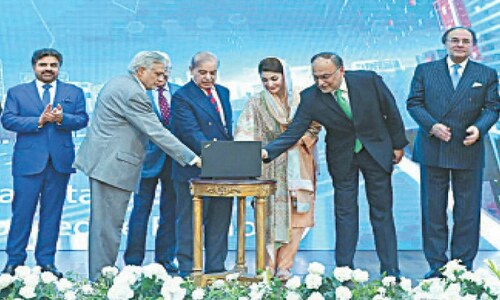ISLAMABAD: Prime Minister Imran Khan on Thursday greeted his Indian counterpart on his party’s victory in Lok Sabha elections and hoped to work together with him for regional peace and prosperity.
“I congratulate Prime Minister Modi on the electoral victory of BJP and allies. Look forward to working with him for peace, progress and prosperity in South Asia,” Mr Khan tweeted as the counting of votes in India showed the Bharatiya Janata Party (BJP) in commanding lead.
Mr Khan had a few weeks earlier said that Mr Modi’s victory would bolster the prospects of peace in the region. “Perhaps if the BJP wins, some kind of settlement in Kashmir could be reached,” he had said.
Relations between Pakistan and India lurched from one crisis to another during Prime Minister Modi’s first term (2014 –19). During that period, an unprecedented spike in ceasefire violations was witnessed along the Line of Control and the Working Boundary. Moreover, the Modi government took some extremely dangerous and provocative steps, including the so-called surgical strike in 2016 and the aerial incursion during the post-Pulwama military stand-off. It had appeared as if Mr Modi kept looking to make limited scale hostilities the new normal between the two countries.
Analysts fear BJP’s electoral win will embolden it to adopt more aggressive posture towards Pakistan
Mr Modi also worked to isolate Pakistan on the international front.
Imran Khan had, in his inaugural speech after assuming the office of prime minister, offered an olive branch to India and later announced opening of Kartarpur Corridor which would, on becoming operational, give Indian Sikhs visa-free access to the shrine of the founder of their religion on Pakistani side of the border.
Foreign Minister Shah Mahmood Qureshi, in an informal chat with Indian External Affairs Minister Sushma Swaraj on the sidelines of Shanghai Cooperation Organisation’s ministerial meetings on Wednesday, expressed Pakistan’s readiness to start dialogue with India on contentious issues.
Meanwhile, the Islamabad Policy Institute (IPI), a think tank specialising in regional issues, in its preliminary reports on Indian elections, has expressed scepticism about normalisation of Pakistan-India relations during the second term of Mr Modi .
The think tank contends that the BJP has won a second consecutive term in office by rallying its hardline Hindu nationalist base and highlighting the national security element. This winning strategy, the IPI believes, could encourage Prime Minister Modi’s government, in its next tenure, to persist with its harsh policy for Pakistan and pursue domestic policies that will be prejudicial to the interests of minority communities, particularly India’s 190 million Muslims.
The think tank has noted that the BJP’s success, despite doing little in its first term to tackle growing unemployment and distress among farmers and lacklustre economic growth, may embolden it to fan the fires of religious hate and jingoism, out of its understanding that it appeals to the party’s hard-core supporters. It could, therefore, possibly go for controversial steps like construction of a Hindu temple on a disputed site, and legislate for life sentence for cow slaughter, fanning religious hatred. The BJP will adopt policies that put Hindus first, the IPI suspects.
“As things stand, an immediate breakthrough in relations with Pakistan appears highly unlikely. It is anticipated that BJP government in its second tenure would adopt a more aggressive posture towards Pakistan, because of its belief that it was ultimately its anti-Pakistan credentials that earned it another term despite poor performance over the past five years,” it adds.
Dr Mohammad Mujeeb Afzal, editor of the coming report ‘BJP Election Victory: Implications for Indian foreign policy and Pakistan’ in his comments noted: “The BJP victory will provide a popular sanctification to the correctness of its policies for the last five years both at the regional as well as international level.” He believed that the BJP would increasingly rely on the support of the hardline elements of the Hindutva forces.
The BJP could, he warned, continue its policy of suppression of the Indian Muslims in the name of fostering cultural homogeneity, violent suppression of the Kashmiri people’s struggle for self-determination through human rights violations and by enforcing demographic changes, and forcing Pakistan to accept a new strategic normalcy of the Indian regional hegemony.
IPI Executive Director Professor Sajjad Bokhari said the election results would take away from BJP government whatsoever incentive it could have for treating the minorities better or correcting the course of its Pakistan policy.
Published in Dawn, May 24th, 2019















































Dear visitor, the comments section is undergoing an overhaul and will return soon.